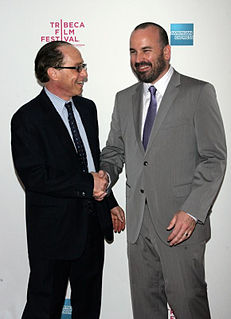A Quote by David Lagercrantz
The capacity of computers is doubling every eight months. It's exponential development. I think it's a real threat, actually, that a computer one day will be more intelligent than us.
Related Quotes
With genetic engineering, we will be able to increase the complexity of our DNA, and improve the human race. But it will be a slow process, because one will have to wait about 18 years to see the effect of changes to the genetic code. By contrast, computers double their speed and memories every 18 months. There is a real danger that computers will develop intelligence and take over. We urgently need to develop direct connections to the brain so that computers can add to human intelligence rather than be in opposition.
Computers get better, faster than anything else ever. A child's PlayStation today is more powerful than a military supercomputer from 1996. But our brains are wired for a linear world. As a result, exponential trends take us by surprise. I used to teach my students that there are some things, you know, computers just aren't good at like driving a car through traffic.
Science fiction does not attempt to predict. It extrapolates. It just says, "What if?" not what will be? Because you can never predict what will happen, particularly in politics and economics. You can to some extent predict in the technological sphere - flying, space travel, but even there we missed badly on some things, like computers. No one imagined the incredible impact of computers, even though robot brains of various kinds but the idea that one day every house would have a computer in every room and that one day we'd have computers built into our clothing, nobody ever thought of that.
At the age of 5, when I was in kindergarten, I often used to pass by the computer labs and see students doing work on computers. I realized that calculation, which would take us a long time to do, can be done in less than a second with the help of computers. So that is how my interest in computers began.
What, then, is the basic difference between today's computer and an intelligent being? It is that the computer can be made to seebut not to perceive. What matters here is not that the computer is without consciousness but that thus far it is incapable of the spontaneous grasp of pattern--a capacity essential to perception and intelligence.
Run for your lives-the computers are invading. Awesomely powerful computers tackling ever more important tasks with awkward, old-fashioned interfaces. As these machines leak into every corner of our lives, they will annoy us, infuriate us, and even kill a few of us. In turn, we will be tempted to kill our computers, but we won't dare because we are already utterly, irreversibly dependent on these hopeful monsters that make modern life possible.
The irony is that I use computers every day of my life to do music because I edit all of my music in a computer. But when it comes to doing live processing, I prefer, as a performer with an instrument, not just having the computer as the only thing I have. I really prefer and find it much more flexible to have the limitations of pedals.
Right now, 70 percent of the people don't have computers. And where they're needed most, people don't have them. We think this will enable anyone to own a computer. We're aiming at everybody who uses a computer as an information access device. The original idea was to build one cheaply enough to put one on every desk.
































